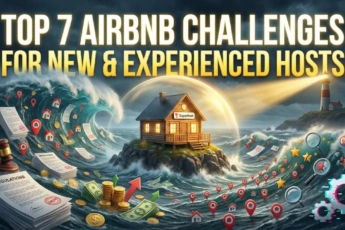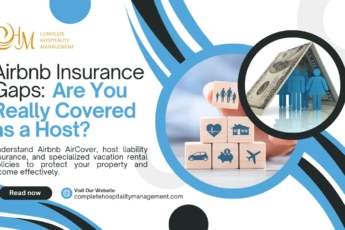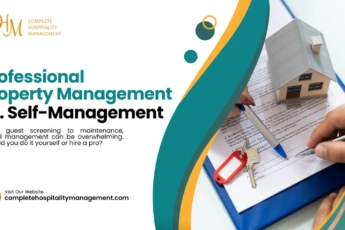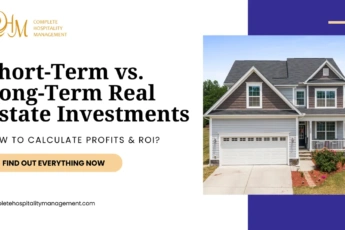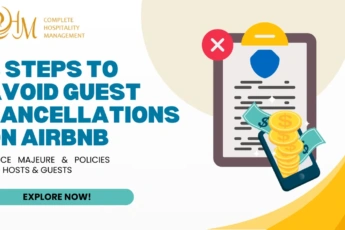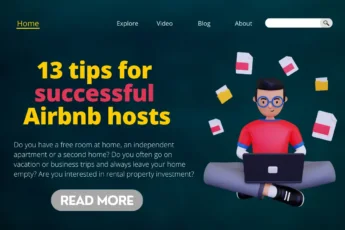Top 10 Words in the Airbnb Descriptions You Must Avoid in 2026
Airbnb description, title, and photos are the fists things potential guests see. They won’t evaluate you based on the sidewalk’s condition. People will make their decisions completely based on the information in your listing, the visuals, and the mental pictures your property description generates.
If your conversion rate from inquiries to bookings is less than 50%, your title and/or description may be ineffective and influence guests to choose a different host.
What makes an Airbnb description attractive?
The ideal Airbnb listing has a clear, consistent tone of voice, lists all the property’s key characteristics, and persuades people to book. But obvious spelling errors, difficult phrase construction, lengthy sentences, and bad language are instant turnoffs. You should avoid many pointless phrases and overused words to write a property description that works.
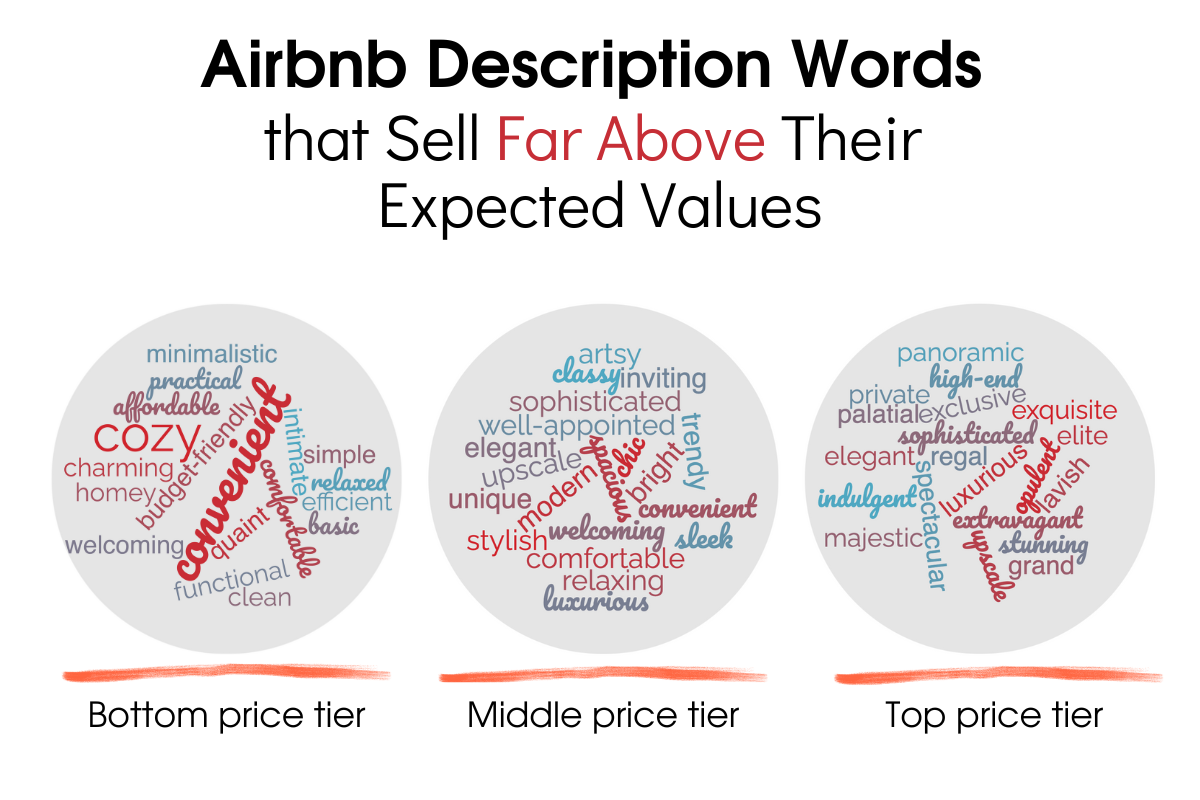
60 words for the Airbnb description that sell far above their expected values
So what specifically are you to avoid? See the ten words you should never use in your Airbnb description.
1. Avoid using the word “impressive”
in listings
Every home seems to have “impressive” vistas, but sadly, this once potent phrase has become so overused that it fails to elicit any feeling in the reader. When describing your environment, beach, or sunset views, strive to draw the reader’s attention with a more poetic and moving phrase. Use next ones:
- Stunning
- Breathtaking
- Spectacular
- Gorgeous
- Magnificent
- Striking
- Beautiful
- Splendid
- Grand
- Remarkable
Describe your surroundings and ask guests what they would miss if they stayed elsewhere. For instance, using phrases like “majestic mountain views,” “spectacular sunsets,” “sparkling emerald waters,” and “vibrant rural scenery” would help the reader form a much more lasting impression.
2. Forget about “must” in the
Airbnb description
When guests hear they “must” do anything during their holiday, they start to look for another more tranquil getaway. Giving someone the feeling they “must” do anything does not imply the independence that visitors seek. You should include these in your “suggestions” or “our top recommendations.”
Why avoid using “must” in listings
| Reason | Explanation |
|---|---|
| Implies obligation | Using “must” may make guests feel obligated to do something during their stay, which may not be appealing. |
| Can feel bossy | Using “must” can make hosts sound bossy, putting guests off. |
| Goes against the spirit of Airbnb | The whole concept of Airbnb is about offering a special and personalized experience, and using “must” can take away from that. |
| Limits options | When hosts use “must,” guests may feel like they have to follow strict rules and limitations, which can detract from the fun and spontaneity of travel. |
| Comes across as inflexible | Using “must” can make hosts seem inflexible and unwilling to accommodate their guests’ needs and preferences. |
Although it may be necessary for guests to “must” go through one bedroom to access another, “must” put their trash in the designated bins, or “must” clean up after their pets, the description of your property is not the appropriate place for that.
3. Don’t include “hidden gem”
in the listing description
The phrase “hidden gem” was coined by someone who clearly understood what they were referring to, but it has since been repeated so frequently that its original meaning has been utterly lost. Skeptical people could even wonder if your vacation rental is a “hidden gem”:
- Overused. It has lost its original meaning and impact.
- Vague. It may not accurately describe your property or its special features.
- Misleading. Guests may expect something more exclusive or upscale than what you offer.
- Cliché. It makes your listing sound generic and unoriginal.
- Lack of specificity. It does not provide details about a property for guests to make an informed decision.
Without using the other overused phrase “out of the ordinary,” try to develop a newer, more creative descriptor. You might also use phrases like “hidden treasure,” “off-the-beaten-path retreat,” and “secret oasis.”
4. How the word “everyone” destroys
the imagination of guests
Your vacation property may be surrounded by historical landmarks, beautifully landscaped gardens, well-known theme parks, sandy beaches, energizing promenades, and renowned dining establishments. Giving the reader that information is essential rather than choosing the uninteresting “something for everyone” alternative.
- “This space is perfect for everyone.” – It is generic and doesn’t provide any specific details about what makes the space special or appealing.
- “Our amenities cater to everyone’s needs.” – It is too broad and doesn’t provide any specific information about what amenities are actually available.
- “Our location is convenient for everyone.” – This statement doesn’t provide any specific details about what makes the location convenient and could be seen as a generic marketing ploy.
Do not generalize. Let the guests’ minds roam and envision themselves on vacation there. Describe how they will fit in your property. If families frequently book with you, add “family and kid-friendly” to the Airbnb description.
5. Never use “broken” for your
property listings
Instructions such as “open carefully” or “ignore the damaged bath” are immediately unappealing. Potential visitors may be put off by a written warning of a potential hazard if they fear getting hurt or punished for damaged property. As a result, they may move on to another rental property.
Why the word “broken” is harmful to the listing
| Reason | Explanation |
|---|---|
| It can be unappealing | Seeing a warning about potential hazards or damaged property can turn off potential guests who may fear getting hurt or blamed for the damage. |
| It may lead to cancellations | Guests may move on to another rental property if they see warnings about broken or damaged items. |
| It is unacceptable | Anything broken, harmed, or flawed is unacceptable and should be fixed immediately to prevent bad ratings and further damage. |
| It is the least expensive option | Fixing broken or damaged items immediately is the least expensive option in the long run, as it can prevent further damage and bad reviews. |
Anything that is harmed, broken, or flawed is unacceptable. To prevent bad ratings and possibly cancellations, fix it right away. It is the least expensive option over the long term. If you want to know what else destroys your listing, even if it doesn’t have broken things, consult with us.
6. What is wrong with “small” in
Airbnb description
Avoid mentioning how small or crowded a room or studio is. There are many inventive methods to accurately describe a small property without lying, which can only lead to negative reviews. Here are some alternative phrases you can use:
- Cozy
- Intimate
- Thoughtfully designed
- Efficient use of space
- Compact and comfortable
- Charming
- Perfect for solo travelers or couples
- Distinctive and cozy retreat
Using the word “small” can be off-putting to potential guests, suggesting a lack of space and comfort. Be more creative with the wording you employ. “Cozy,” “thoughtfully designed,” and “harmonious” conjure up an odd vision of a warm and personal room that has its own romantic charm and domestic appeal.
7. Put away “never” to sound more
relaxing and optimistic
Refrain from intentionally using a negative word, even when used in a positive context. “Never” is forceful and unyielding. Even “a vacation you’ll never forget” can appear harsh and commanding. This might be off-putting for someone trying to escape the daily grind of job, responsibility, and habit.
How to replace the word “never” in the listing description
| Bad examples | Alternative language |
|---|---|
| “A vacation you’ll never forget” | “An unforgettable vacation experience” |
| “Don’t miss out on this opportunity” | “Experience something special” |
| “Never again will you find a place like this” | “A distinctive and one-of-a-kind experience” |
| “Warning: You may never want to leave” | “Relax and unwind in this tranquil getaway” |
| “Leave your worries behind” | “Escape to a worry-free retreat” |
Using uplifting, energizing, softer, and inviting language might be more helpful. You may say something like “an unforgettable vacation experience,” “a getaway you’ll always cherish,” “a trip that will create lifelong memories,” or “a vacation you’ll remember forever.”
8. Why “nice” & “good” are ‘no’
in the Airbnb description
Fine, nice, or pleasant are overused or clichéd adjectives. They have become stale. They were once hip and useful terms, but now they imply that the author is unoriginal and overly lazy. You don’t want potential customers to believe that your company is careless and that the vacation rentals lack distinctive features, do you?
- “a nice apartment” – “a cozy and welcoming apartment”;
- “nice furnishings” – “stylish and tasteful furnishings”;
- “nice amenities” – “high-quality amenities that make your stay comfortable and convenient”;
- “a nice view” – “a breathtaking view that will leave you in awe”.
Try to change “pretty, fine, or nice” to words like ‘must-see, super comfortable, bewitching, charming’ – anything that sounds better than boring “fine or nice.” Or you can entrust your property under the management of the CHM team, and we will make your listing outstanding.
9. Don’t use “first-class” for the property
to avoid misunderstanding
The term “first-class” is usually a major overstatement unless you’re referring to the Louvre in Paris, a three-Michelin-starred restaurant, or an Olympic medalist. It’s unlikely that your house will be “first class,” so don’t write anything that won’t pass muster.
Alternatives to the overused word “first-class” in Airbnb listings
| Word | Substitute |
|---|---|
| First-class amenities | High-quality amenities |
| First-class accommodations | Exceptional accommodations |
| First-class service | Personalized and attentive service |
| First-class experience | Memorable and special experience |
| First-class luxury | Indulgent and luxurious |
| First-class facilities | Top-notch facilities |
| First-class property | Exceptional property |
| First-class location | Prime and convenient location |
| First-class stay | Unforgettable and comfortable stay |
| First-class features | Desirable features |
| First-class comfort | Luxurious and comfortable |
Make an effort to utilize adjectives like “exceptional,” “extraordinary,” or “sublime,” which are far more credible. It works better to highlight the advantages and facilities of the home using precise and evocative wording.
10. The word “unique” means “never book”
to the guests
Every short-term rental property is unique. Using this word to describe your vacation rental would be a waste. It doesn’t necessarily give prospective guests much information. Here is other reasons:
- Overused. Many Airbnb hosts use the word “unique” to describe their property, so it can come across as a generic and unoriginal description.
- Vague. “Unique” doesn’t provide any specific information about the property or what makes it special. It can be interpreted in many different ways, which can be confusing for guests.
- Ambiguous. Using “unique” can raise expectations for guests, and if they don’t feel that the property lives up to its “unique” description, they may be disappointed and leave a negative review.
Instead of stating the obvious and running the danger of losing the guest’s interest, make every word matter. Show, don’t tell when writing. Instead of describing the facts, let the reader visualize themselves “enjoying a bubbly soak in the oversized tub with a glass of wine and soft candlelight”.
As a general conclusion
Writing an effective Airbnb description that attracts people is not that easy. You should avoid overused words and describe the property’s special features, surroundings, and benefits using more vivid and imaginative language. A well-written description aims to create a memorable mental image in the reader’s mind that convinces them to choose the vacation rental.
If you are stuck with creating Airbnb titles and descriptions or anything else regarding property management on Airbnb, you can write to us, and we will do everything from A to Z to make your listings attractive for potential guests!
Words to use instead of useless ones in the Airbnb description
| Words to avoid | Reasons | Substitute terms / actions |
|---|---|---|
| Impressive | Overused and fails to arouse any emotion in the reader | Majestic, spectacular, sparkling, vivid |
| Nice, good, fine | Overused and suggests the writer is lazy and unoriginal | Super comfortable, bewitching, charming |
| Everyone | Generalizes and destroys the imagination of guests | Describe specific groups, such as “family and kid-friendly” |
| Hidden gem | Overused and the meaning is lost | Secret oasis, off-the-beaten-path retreat, hidden treasure |
| Broken | Causes potential guests to worry about being harmed, blamed, or charged for broken furniture | Fix any damage immediately |
| Small | Negative connotations and can result in disappointing reviews | Cozy, thoughtfully designed, harmonious |
| Unique | Overused and generic | Use descriptive language to allow the reader to see themselves in the space |
| Must | Suggests a lack of freedom and relaxation | Consider using “recommended” or “optional” instead |
| First-class | Implies exclusivity and may turn off some visitors. | High-end, premium, deluxe |
| Never | Too extreme and doesn’t acknowledge that things may not always go perfectly | Avoid using this word and focus on the positive aspects instead |
Frequently asked questions
about Airbnb description mistakes
1. What makes a good Airbnb description?
A good Airbnb description should be accurate, detailed, concise, use descriptive language, be positive, include high-quality photos, and be transparent about any limitations or drawbacks.
2. How long should Airbnb description be?
Although there is no set length restriction for Airbnb descriptions, it is advised to keep them brief and to the point. Your description shouldn’t be too long to read, but it shouldn’t be too short either. It should be long enough to accurately and thoroughly describe your listing. Although it can vary based on the type of accommodation and the quantity of information you need to express, a reasonable rule of thumb is to aim for between 250 and 500 words.
3. How do I write a description on Airbnb?
To write an effective Airbnb description, consider the following steps:
- Begin with a catchy headline that summarizes the key selling points of your listing.
- Provide a detailed and accurate description of your space, including the type of accommodation, location, sleeping arrangements, amenities, and unique features.
- Use descriptive language to paint a vivid picture of what it’s like to stay at your listing, including the atmosphere, ambiance, and surroundings.
- Include high-quality photos that showcase the interior and exterior of your listing from multiple angles.
- Communicate any house rules that guests should be aware of, such as quiet hours, no smoking or pets allowed, or check-in and check-out times.
- Highlight any special features or experiences that make your listing stand out from the competition.
- Include positive reviews from previous guests to help build credibility and trust with potential guests.
Remember to be honest and transparent and provide all the necessary information that potential guests may need to make an informed decision about booking your listing.
4. What should be included in Airbnb description?
Your Airbnb description should provide an accurate and detailed description of your listing and its features. Some things to include in your Airbnb description are:
- description of the accommodation;
- location;
- sleeping arrangements;
- amenities;
- house rules,
- distinctive features;
- positive reviews.
Be detailed and honest to help potential guests understand what to expect during their stay.
5. What is the best profile description for Airbnb?
For example, we can provide this: “Welcome to my cozy apartment in the city’s heart! Perfect for couples or solo travelers, my place offers a comfortable stay with all the necessary amenities. Explore the city’s best attractions just steps away, then return to unwind in a peaceful retreat. Book now for an unforgettable stay!”
6. What should my Airbnb bio say?
Your Airbnb bio should introduce yourself as a host and highlight your unique qualities and experiences that make you an excellent choice for guests. Some tips to consider when writing your Airbnb bio are:
- Keep it concise. Your bio should be short and sweet, no more than a few sentences;
- Highlight your strengths. Focus on your positive attributes and what sets you apart as a host;
- Share your interests. Let guests know what you enjoy doing in your free time or any hobbies you have that could make for a fun experience for guests;
- Mention your hosting style. Let guests know what kind of experience they can expect when staying with you, such as whether you like to give them space or are happy to interact with them;
- Be authentic. Write in your own voice and be honest about who you are.
- Update it regularly. Keep your bio updated with any changes to your hosting style or interests.
Remember that your Airbnb bio is an opportunity to make a positive first impression and give guests a sense of who you are as a host.
7. What is the business description of Airbnb?
Airbnb is an online platform that allows people to rent short-term lodging in various forms, such as vacation rentals, homestays, and hotel rooms, worldwide. It enables hosts to list their properties and guests to book accommodations, while providing safety measures and support services.
8. How many words are allowed in an Airbnb description?
There is no set limit for the number of words in an Airbnb description, but it’s recommended to keep it concise and informative, typically between 250 to 500 words.
9. How do you write a good profile description?
To write a good profile description, be concise, specific, authentic, positive, creative, and mindful of your audience. Highlight your strengths and achievements and use storytelling or humor to make your profile stand out.
Updated on: . Author:

